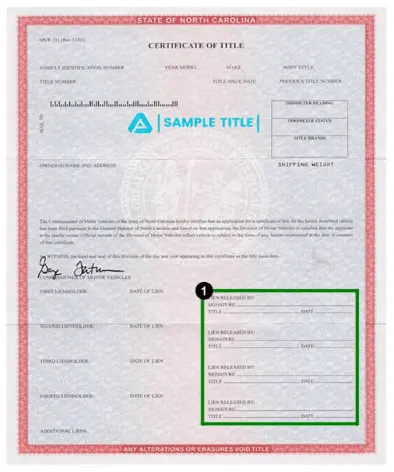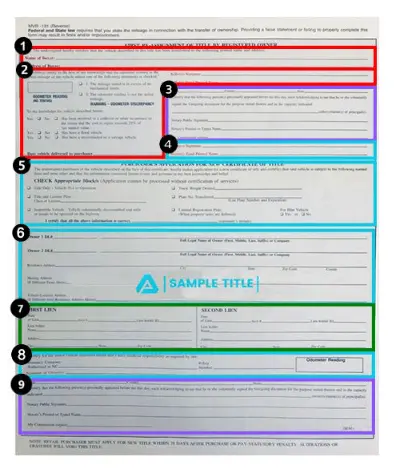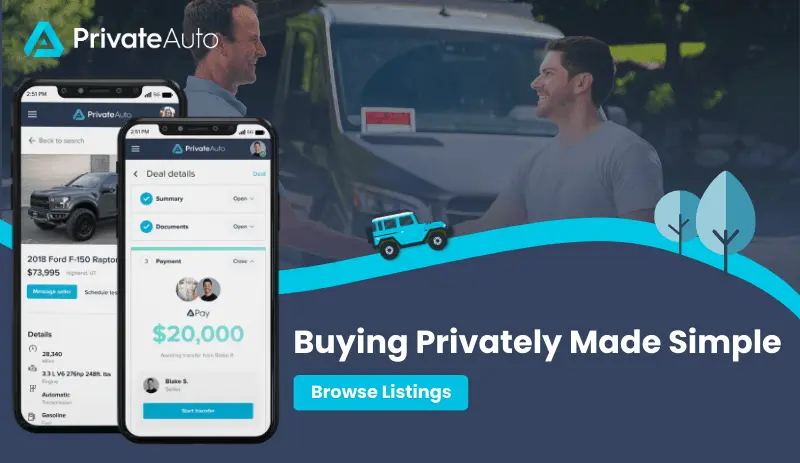The title transfer needs to be carried out correctly. This North Carolina title transfer guide gives you everything you need to know to transfer a vehicle title in the Tarheel State.
What is the NC title transfer process?
Vehicle Title Transfer Process
There are two stages to a North Carolina car title transfer.
- The two parties (buyer and seller) meet in person. The buyer pays the seller. Both fill out the physical certificate of title, and sign it. From this point on, the buyer is the legal owner of the car.
- The buyer finalizes the transfer of ownership with the North Carolina Division of Motor Vehicles (DMV). At the same time, the buyer registers the car and applies for new license plates.
The first step (seller and buyer meeting) is the most important. The second step is a necessary formality.
- As the seller, you’ll formalize the entire transaction when you transfer the ownership of the car by signing the title over to the buyer. You’ll remove the license plates and be done with the vehicle. If you’ve lost your vehicle title, you’ll need to apply for a replacement with Form MVR-1 prior to meeting the buyer.
- As the buyer in a private car sale, you become the legal owner of the car as soon as the seller transfers the title to your name. You’ll finalize with DMV to get title and registration in your name. You’ll also get new North Carolina license plates and car insurance.
See our complete guide to buying a vehicle in North Carolina for more in-depth information on the entire process.

What paperwork is required?
Sign a NC Title Correctly
When signing the title certificate, always keep the following in mind.
- Mistakes make the document invalid.
- Do not erase anything or use white-out.
- Only use black or blue ink. Any other color will void the title.
- Write neatly.
- Only use legal birth names.
How to correctly fill out the title transfer form?
Front of Title
The front of a North Carolina title has a section for lienholders. If there is a lien on the title, the lienholder will need to release the lien in the green-colored section shown below.

Back of Title
The back of the title has sections for the seller (red), the notary (purple), and the buyer (teal). Here is the process for filling out the back of a North Carolina title.

- In the red rectangle, marked “1”, the seller enters the name and address of the BUYER.
- The seller enters the exact odometer disclosure reading, fills out the damage disclaimer section, enters the vehicle delivery date, and signs and prints their name in the red field marked “2”.
- In the purple rectangle marked “3”, a notary enters the required information.
- The buyer signs and prints their name in the blue-colored rectangle.
- The buyer will fill out the application for a new title certificate simply by filling out the info that applies to them, signing, and checking the boxes in the blue field marked “6”.
- In the blue rectangle, the buyer will fill out their personal info (full legal name, drivers license number, address, city, zip code, and county).
- If applicable, the lienholder enters the information in the green rectangle.
- The buyer enters their car insurance company, policy number as well as an accurate odometer reading followed by their signature.
- In the last purple rectangle, the notary will enter the required information.
Congrats! You’ve completed the first part of a NC title transfer. Pretty simple, right? Now you need to complete the transfer with the DMV.
Finalize with NC DMV
You’ve done the deal and are the proud owner of a new-to-you vehicle. You still need to register the car and transfer the title with the State of North Carolina. At the same time you submit vehicle registration paperwork and a title transfer request, you’ll apply for new NC license plates. You’ll also need to pay sales taxes and fees.
Bring the following to your local NC DMV office:
- All documents provided by the car’s seller (especially the original title as proof of ownership, signed by the previous vehicle owner)
- A motor vehicle title application (form MVR-1)
- Proof of identity (such as a valid driver license)
- Vehicle title transfer fee: $56
- Payment for highway use tax (HUT): 3% (form MVR-613.pdf))
- Registration fees
- Payment for sales tax (North Carolina car sales tax is 7.5%)
- Proof of insurance
- Proof of passed emissions inspection (unless exempt—see below)
- Proof of passed safety inspection
Consult with your local DMV office to make sure you complete all additional paperwork that North Carolina requires.
The North Carolina DMV accepts the following forms of payment:
- Cash
- Money orders
- Personal checks
- Visa, MasterCard, American Express, and Discover credit cards or debit cards
North Carolina Title Transfer Form MVR-1
North Carolina’s MVR-1 form requires you to fill out the following information, after which you’ll submit the form to your local DMV office.
- Your name
- Date
- Your address
- Your Social Security Number or Federal Employer Identification Number
- Vehicle information:
- Make
- Model
- Year
- Vehicle Identification Number (VIN)
- Registration number
- Title number
- Reason for title transfer (e.g., recent sale of the vehicle)
- Since you’ll have recently purchased the vehicle, the form requires information about the sale, such as:
- Date of sale
- Name and address of the person who sold you the car
- Purchase price
- Vehicle’s odometer reading at the time of sale
- Whether the vehicle is or is not subject to a lien
- Your signature with date
Is a NC smog check required?
North Carolina Emissions Testing
Certain North Carolina counties require emissions testing, while others don’t. If you’re registering your car in a county that requires it, you’ll need to have proof of a passed emissions test before the state will complete your title transfer and registration request.
Which NC Counties Require Emissions Testing?
In the State of North Carolina, the following counties require emission testing:
- Alamance
- Buncombe
- Cabarrus
- Cumberland
- Davidson
- Durham
- Forsyth
- Franklin
- Gaston
- Guilford
- Iredell
- Johnston
- Lincoln
- Mecklenburg
- New Hanover
- Randolph
- Rowan
- Wake
- Union
A NC emissions inspection costs $30.
North Carolina Emissions Testing Exemptions
In the 19 NC counties that require emissions testing, cars in the following categories are exempt:
- Light-duty cars less than 3 years old or that have 70,000 miles or less
- Cars that are 20 years old or older
- Diesel-operated cars
- Kit cars
- Plug-in hybrid cars
North Carolina Safety Inspection
Your new-to-you car will need to pass a safety inspection before you can finish the title transfer and registration.
If you’re registering an out-of-state car in North Carolina, it may be exempt from the safety inspection requirement. To get the exemption, submit proof of recent maintenance. This can include an oil change receipt, tire rotation receipt, or other service invoice.
The service invoice must include the name, phone number and address of the service provider, along with the vehicle’s plate or VIN number, make, model, year, and a recent date of service.
Invoices for maintenance or an out-of-state inspection must be dated within the past four months when submitted.
Exemption requests can be submitted through the North Carolina License & Theft Bureau Portal’s online request system.
Is a bill of sale required?
North Carolina Bill of Sale
North Carolina doesn’t require a bill of sale in the private sale of a car. Even though it’s not required, it’s a good idea to complete a bill of sale. The document memorializes the terms of the sale and protects both parties in the event that the other party ever wants to contest any aspect of the transaction.
The easy PrivateAuto transaction flow involves both parties electronically signing the bill of sale in the PrivateAuto mobile app. The whole transaction, bill of sale included, can be completed in just a couple of minutes when you meet for the test drive and approve the car. It’s quick, easy, and convenient. You will always have the bill of sale accessible in your PrivateAuto account to prove that the transaction was legitimate.
NC License Plates
Some states allow the license plates to remain with the car when sold. Unfortunately, North Carolina requires the seller to remove plates from the car. As the buyer, you’ll apply to the DMV for new license plates, and pay the $38.75 North Carolina license plate fee.

Buy and Sell Cars in North Carolina With PrivateAuto
Complete private party vehicle transactions easily and legally with the help of PrivateAuto. Our technology-driven platform helps you find verified buyers and sellers, sign documents online, and get paid. Here are the steps to sell your car on PrivateAuto:
- Complete necessary documentation
- Make your PrivateAuto account and get verified
- List your car
- Set your terms
- Vet incoming offers
- Choose a buyer
- Schedule a test drive
- E-sign documents
- Get paid instantaneously
- Transfer ownership
- Remove the license plates
- Cancel current car insurance
Interested in Buying a Used Car in North Carolina?
PrivateAuto makes buying a used car in North Carolina fast and simple. Whether you’re looking for a Toyota RAV4, a Ford F-Series, or a Ram 1500/2500/3500, you’re sure to find a great deal on the ride of your dreams. Browse used vehicles for sale.
North Carolina Title Transfer FAQ
What is the safest method of payment when selling an NC car?
With PrivateAuto Pay, you can get paid instantaneously through our app with our integrated banking partner.
By receiving your money through our integrated banking system, both buyers and sellers can stay safe while exchanging large sums of money, as they don’t have to share their contact or banking information during the car buying process.
PrivateAuto Pay is instant, fee-free, and works for any amount of money.
How to transfer a car title when the owner is deceased?
In the state of NC, when the owner of the car is deceased, a beneficiary, spouse or joint-owner can transfer the title.
How to transfer a title after a lease buyout?
Once you pay off the loan on your car, you can request to have the lien removed from your car title by applying for a duplicate title (form MVR-4).
How to transfer a vehicle title when you have an out-of-state title?
If you have an out of state title, you will need to take your out-of-state title certificate to the nearest NC DMV office.
Additional documentation that you need to have with you during this process:
– Vehicle Identification Number inspection certificate
– Valid driver’s license
– Payment for NC vehicle title transfer fees
How to request a duplicate title in North Carolina?
Replacing the car title is required if it’s damaged, stolen, or if a lien needs to be removed.
To apply for a duplicate title you need the following:
– The application for duplicate title (form MVR-4)
– A lien release form from your lien holder for any liens on the vehicle
– Proof of ID
– Payment for the NC duplicate title fee of $21.50
Should I remove my license plates when I sell a used car in NC?
Yes, the seller must take off the license plates when selling a used car in North Carolina. The buyer will need to apply to the DMV for new license plates.
Where can I go to transfer a vehicle title in North Carolina?
There are many different NC DMV locations, but these are the most common ones:
Department of Motor Vehicles
27 Plaza Pkwy
Lexington, NC 27292
Department of Motor Vehicles
1022 Randolf Street Ste 13
Thomasville, NC 27360
What is a North Carolina instant title?
An instant title is an expedited North Carolina car title:
– Instant titles allow buyers to transfer a newly purchased vehicle into their name right away, without having to wait the standard timeframe for a traditional mailed title.
– To get an instant title, the purchase must be completed in person at the North Carolina Division of Motor Vehicles (DMV) office.
– Both the buyer and seller must be physically present at the DMV with proper identification and documentation in order to process an instant title.
– There is a $52 fee to obtain an instant title in North Carolina. This is in addition to standard vehicle title and registration fees.
– After processing, the instant title is printed right at the DMV office and provided on the spot, enabling an immediate transfer of ownership.
An instant title allows a vehicle buyer and seller to expedite the traditional titling process by facilitating a direct, in-person title transfer when certain requirements are met at the local North Carolina DMV office. This avoids having to wait days or weeks for a mailed title.
